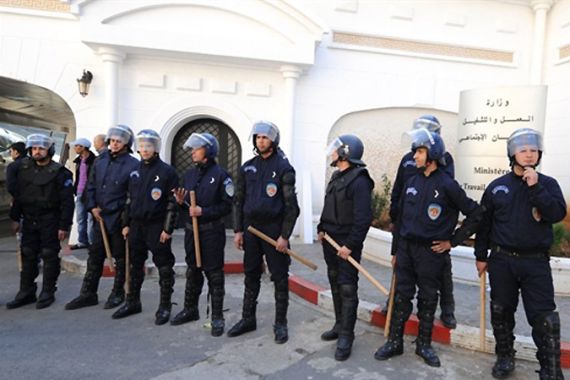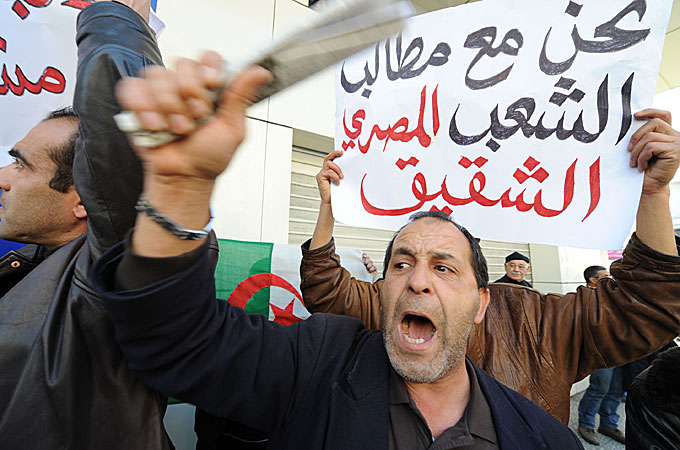Algeria protesters push for change
Pro-democracy demonstrators, inspired by the Egyptian revolution, ignore official ban and march in the capital Algiers.

Algerian security forces and pro-democracy protesters have clashed in the capital, Algiers, amid demonstrations inspired by the revolution in Egypt.
Heavily outnumbered by riot police, at least 2,000 protesters were able to overcome a security cordon enforced around the city’s May First Square on Saturday, joining other demonstrators calling for reform.
Earlier, thousands of police in riot gear were in position to stop the demonstrations that could mimic the uprising which forced out Hosni Mubarak, Egypt’s long-serving president.
Security forces closed all entrances to Algiers and arrested hundreds of protesters, sources told Al Jazeera.
Elias Filali, an Algerian blogger and activist, said human rights activists and syndicate members were among those arrested at the scene of the protests.
“I’m right in the middle of the march,” he told Al Jazeera. “People are being arrested and are heavily guarded by the police.”
Officials banned Saturday’s opposition march but protesters were determined to see it through.
Peaceful protests
Filali said the demonstrators were determined to remain peaceful, but he claimed that the police “want the crowd to go violent and then get them portrayed as a violent crowd”.
Protesters are demanding greater democratic freedoms, a change of government and more jobs.
 |
| Many demonstrators in Algeria have been inspired by the events unfolding in Egypt and Tunisia [AFP] |
Earlier, police also charged at demonstrators and arrested 10 people outside the Algiers offices of the opposition Rally for Culture and Democracy (RCD), as they celebrated Mubarak’s downfall, Said Sadi, RCD leader, told the AFP news agency.
“It wasn’t even an organised demonstration. It was spontaneous. It was an explosion of joy,” he said.
Mubarak’s resignation on Friday, and last month’s overthrow of Zine El Abidine Ben Ali, Tunisia’s president for 23 years, have electrified the Arab world.
Many are left wondering which country could be next in a region where a flammable mix of authoritarian rule and popular anger are the norm.
“The timing is absolutely perfect. [Mubarak’s departure] couldn’t have come at a better time,” Filali told Al Jazeera in the run-up to the protests.
“This is a police state, just like the Egyptian regime [was].”
Filali said Algeria’s government was “corrupt to the bone, based on electoral fraud, and repression”.
“There is a lot of discontent among young people … the country is badly managed by a corrupt regime that does not want to listen”.
Police on alert
Said Sadi, the RCD leader, had said earlier that he expected around 10,000 more police officers to reinforce the 20,000 who blocked the last demonstration on January 22, when five people were killed and more than 800 others hurt.
Police presence is routine in Algeria to counter the threat of attacks by al-Qaeda fighters. But Filali called the heavy police presence in the capital on Saturday “unbelievable”.
At May First Square, the starting point for the planned march, there were around 40 police vans, jeeps and buses lined up, Filali said.
At several road junctions, the police had parked small military-style armoured vehicles which are rarely seen in the city. Police standing outside a fuel station, about 2km from the square, were wearing anti-riot body armour.
The latest rally is being organised by the National Co-ordination for Change and Democracy (CNCD), a three-week-old umbrella group of opposition parties, civil society movements and unofficial unions inspired by the mass protests in Tunisia and Egypt.
Demonstrators have been protesting over the last few months against unemployment, high food costs, poor housing and corruption – similar issues that fuelled uprisings in other north African nations.
Earlier this month, Abdelaziz Bouteflika, Algeria’s president, said he would lift emergency powers, address unemployment and allow democratic marches to take place in the country, in a bid to stave off unrest.
“The regime is frightened,” Filali said. “And the presence of 30,000 police officers in the capital gives you an idea of how frightened the regime [is] of its people.”
Wider implications
Widespread unrest in Algeria could have implications for the world economy because it is a major oil and gas exporter, but many analysts say an Egypt-style revolt is unlikely as the government can use its energy wealth to placate most grievances.
Meanwhile, in a statement, Amnesty International, the London-based rights group, said “Algerians must be allowed to express themselves freely and hold peaceful protests in Algiers and elsewhere”.
“We urge the Algerian authorities not to respond to these demands by using excessive force”.
The government said it refused permission for the rally for public order reasons, not because it is trying to stifle dissent. It said it is working hard to create jobs, build new homes and improve public services.
Other Arab countries have also felt the ripples from the revolts in Egypt and Tunisia.
Jordan’s King Abdullah replaced his prime minister after protests.
In Yemen, Ali Abdullah Saleh promised opponents he would not seek a new term as president.
The Bahraini government has also made several concessions in recent weeks, including promising higher social spending. Activists there have called for protests on February 14, the tenth anniversary of Bahrain’s constitution.